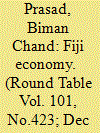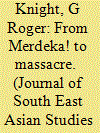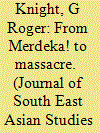|
|
|
Sort Order |
|
|
|
Items / Page
|
|
|
|
|
|
|
| Srl | Item |
| 1 |
ID:
116302


|
|
|
|
|
| Publication |
2012.
|
| Summary/Abstract |
In the 40 years since Fiji became independent, there has been no shortage of perspectives from which to frame its development: its colonial past, its dual status as a Third World and Pacific island state, and, most pervasively perhaps, race conflict. This article focuses on another perspective: the failure of ethnic Fijian leaders to democratise their community politically and economically. Its consequences for the country have been long-standing and lie behind Fiji's developing coup culture.
|
|
|
|
|
|
|
|
|
|
|
|
|
|
|
|
| 2 |
ID:
116305


|
|
|
|
|
| Publication |
2012.
|
| Summary/Abstract |
Twenty-five years since the first military coup in 1987, Fiji continues to muddle through both politically and economically. The promise of a general election under a race-free constitution remains the fervent hope of all citizens. Economically the country continues to slide downwards, reflected in poor economic growth in 2010 and 2011. A poor level of private sector investment remains a feature of the macroeconomic picture, and it is unlikely to change for the foreseeable future. This article provides an overview of the Fiji economy and reflections on future prospects.
|
|
|
|
|
|
|
|
|
|
|
|
|
|
|
|
| 3 |
ID:
117475


|
|
|
|
|
| Publication |
2012.
|
| Summary/Abstract |
Between 1945 and 1965, what may be broadly defined as the politics of sugar in Indonesia passed through several critical stages. The industrial manufacture of sugar had begun in the Netherlands Indies in the mid-nineteenth century, but after a slump during the 1930s Depression, the industry virtually went into abeyance during the Japanese Occupation (1942-45). After the war, the years of struggle for Merdeka! (freedom) also saw a partial revival of the industry, which continued through national revolution and independence (1949) through to an incremental nationalisation in the late 1950s. Developments in the sugar industry culminated in massacre, rather than merdeka, however. The campaign against the PKI (Indonesian Communist Party) which began in 1965 resulted in the murder of labour unionists and peasant activists associated with the sugar industry. This paper traces the course of events from Merdeka to massacre, focusing on the sugar industry of East Java's Brantas valley. Its themes, however, relate to the industry in Java as a whole, and the question of why the commodity production of sugar came to be so deeply embroiled in the politics of the new republic.
|
|
|
|
|
|
|
|
|
|
|
|
|
|
|
|
| 4 |
ID:
117476


|
|
|
|
|
| Publication |
2012.
|
| Summary/Abstract |
Between 1945 and 1965, what may be broadly defined as the politics of sugar in Indonesia passed through several critical stages. The industrial manufacture of sugar had begun in the Netherlands Indies in the mid-nineteenth century, but after a slump during the 1930s Depression, the industry virtually went into abeyance during the Japanese Occupation (1942-45). After the war, the years of struggle for Merdeka! (freedom) also saw a partial revival of the industry, which continued through national revolution and independence (1949) through to an incremental nationalisation in the late 1950s. Developments in the sugar industry culminated in massacre, rather than merdeka, however. The campaign against the PKI (Indonesian Communist Party) which began in 1965 resulted in the murder of labour unionists and peasant activists associated with the sugar industry. This paper traces the course of events from Merdeka to massacre, focusing on the sugar industry of East Java's Brantas valley. Its themes, however, relate to the industry in Java as a whole, and the question of why the commodity production of sugar came to be so deeply embroiled in the politics of the new republic.
|
|
|
|
|
|
|
|
|
|
|
|
|
|
|
|
| 5 |
ID:
092812


|
|
|
|
|
| Publication |
2009.
|
| Summary/Abstract |
Bagasse power generation projects provide a useful framework for evaluating several key aspects of the Clean Development Mechanism of the Kyoto Protocol. On the positive side, our analysis, which draws in part from a data set of 204 bagasse electricity generation projects at sugar mills, indicates that these projects provide Annex I country investors with a cost-effective means to achieve greenhouse gas emissions reductions. Our analysis also confirms that the marketplace for Clean Development Mechanism-derived offsets is robust and competitive. Moreover, bagasse projects appear to provide a positive example in a "new wave" of clean energy investment that has replaced the earlier industrial gas projects. At the same time, we also identify two aspects of the CDM that demand improvement. First, the additionality standard needs to be tightened and made more transparent and consistent. Financial additionality should be required for all projects; however, any financial additionality test applied by the Clean Development Mechanism's Executive Board must be informed by the significant barriers faced by many projects. Second, the administrative processes for registration and verification of offsets need to be streamlined in order to prevent long registration time lags from chilling clean energy investment.
|
|
|
|
|
|
|
|
|
|
|
|
|
|
|
|
|
|
|
|
|